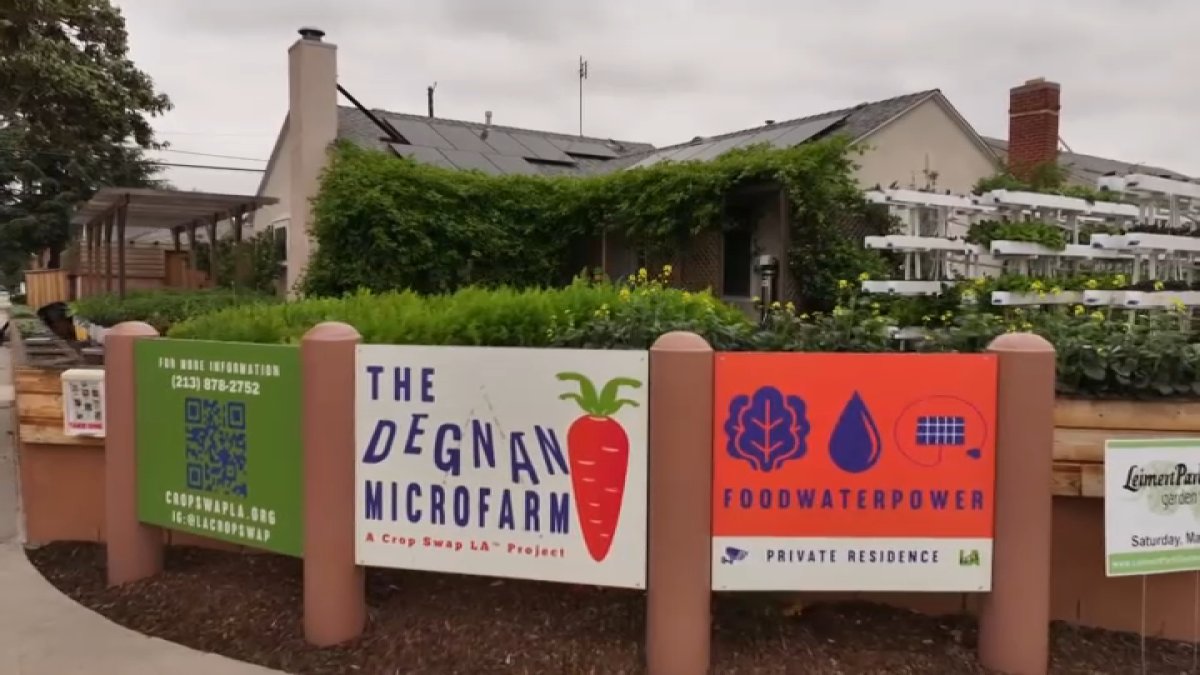
At a time when grocery store prices continue to rise, a “microfarm” in Leimert Park is proving that growing your own food may help you beat inflation and be healthier.
Jamiah Hargins started the Degnan Microfarm at the corner of Degnan Boulevard and Coliseum Street a few years ago in hopes of inspiring his family and community to eat healthier, fresher organic foods. But instead of placing the farm in a community garden or other open space, he chose a much closer location — his front yard.
“We’re here at my home! The Degnan Microfarm in Leimert Park,” Hargins said. “When we saw this house on the market and the big front yard, we decided this is a perfect place for our headquarters to land.”
Hargins founded Crop Swap LA, a nonprofit that has installed nearly a dozen other small farms in South LA at homes, schools and churches.
Originally from New Mexico, Hargins is helping uplift his adopted home of Leimert Park, which is long considered to be a food desert.
“Even if you have access to grocery stores and money to pay the food, the nutritional value in that food has decreased significantly,” he explained. “So we’re trying to not only provide and fix the problem, but also live as an example.”
As produce prices fluctuate amid a torrent of different supply chain factors, Hargins is able to keep his prices low by using nearly every inch of his front and back yards to grow food, such as beets, strawberries, basil, apples, carrots, tomatoes, to name a few.
Every week, about 80 families receive fresh produce delivered to their doors at the cost of $80 per month. The general public can shop here as well, every Monday.
“Tariffs, politics, distribution channels, all of them are out of our hands,” Hargins said. “So we really have to take the power back and show that if we want healthy beets, healthy carrots, healthy fruit, healthy vegetables, and we want it to be environmentally safe on its way here, it’s best to just do it ourselves.”
All of the food he grows is organic, and it’s grown using rainwater that he stores underneath his property, with pumps and other equipment powered by solar panels.
Crop Swap LA, which now has more than a dozen employees, can help install or consult on projects for anyone who is interested in creating a similar microfarm setup, no matter at their own properties.
It also comes with tax incentives.
“There are many benefits to the homeowners. Number one, the space that they allow us to grow in can be written off on their property taxes. Number two, the water that’s used on the property to grow the food can be written off,” he explained. “Number three, the food that we export off the property to distribute can be written off all because we operate as a nonprofit.”
For Hargins, helping his community while serving his own family is all a dream come true.
“This purpose kind of chose me when my first daughter was born and my second daughter’s here, too,” he told us. “She kind of wakes up in this life, like having all this stuff around her. I want that to be their expectation.”
发表回复